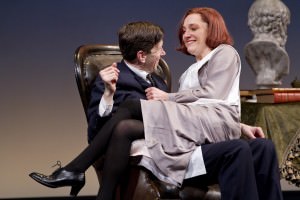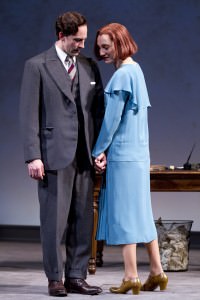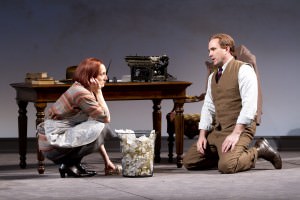Eugene O’Neill, as Stephen Sondheim has written, was an experimental playwright whose theatrical ambition soared far above his literary accomplishment, which often remained earthbound. Strange Interlude, O’Neill’s nine-act psychodrama from 1928, is no exception to this observation. It is a work of vaulting ambition, seeking to capture nothing less than Freudian psychological theory and Joycean stream of consciousness in theatrical form. Yet O’Neill’s aspirations are only imperfectly realized in a script let down by pretentious melodrama, crude psychologizing, and overwrought prose.

A smash hit in its day, Strange Interlude now has a reputation of being virtually unplayable, with its five-hour length, impossibly specific setting and character descriptions, and outmoded ideas. For his revival now playing at the Shakespeare Theatre Company, Director Michael Kahn has scaled back some of the ambition of the play, most notably its epic length, at little cost to dramatic clarity. While cutting the text to a more playable three hours and forty minutes (with two much needed intermissions), Kahn and company have otherwise hewn closely to a traditional reading of the play. The result is an accessible, respectful, and dramatically coherent production of O’Neill’s now neglected play, an admirable achievement in itself. Yet it is a production that feels more dutiful than engrossing and fails to capture a sense of theatrical daring and imagination that would justify the play’s new lease on life.
Strange Interlude’s initial success largely derived from its treatment of sensational subject matter in the language of Freudian psychology. O’Neill reveals the tumultuous inner lives of his characters through his use of “thought asides,” his innovative dramatic technique in which the action is paused as characters speak aloud their stream of consciousness. Unfolding over the span of twenty-seven years, O’Neill’s self-described “woman play” tells the story of Nina Leeds, a disillusioned, neurotic, and desperately passionate woman who seeks to overcome the loss of her fiancé in World War I by manipulating the men around her. The play was infamously banned in Boston and Providence for its lurid subject matter – promiscuity, adultery, abortion, eugenics, and other offenses to Puritan sensibilities.
The theatrical interest of Strange Interlude today lies less in the play’s soap operatic plot or conception of womanhood than in the strength of its characterizations and experimental theatrical technique. Kahn’s production, alas, plays more to Strange Interlude’s weaknesses than its strengths. While the inner monologues originally comprised two-thirds of the play, in Kahn’s edition they are reduced to less than a third of the text. The production has retained the outward shape of the drama, including all of melodramatic twists and turns of the plot, at the expense of a deeper excavation of the inner lives of the characters. O’Neill himself considered the “thinking aloud” more important than the dialogue, and the production lacks some of the dramatic power that comes from the recurrence of inner thoughts and motifs. One also misses the sheer theatrical extravagance of actors constantly wearing their emotions on their sleeves.

Kahn’s workmanlike direction brings coherence to the evening, if not inspiration. For Kahn, the clarity of the spoken line is supreme, and the acting is unmannered and the stage business unfussy. The remnants of O’Neill’s soliloquies are artfully integrated into the dramatic flow of scenes; there is never any confusion between the asides and dialogue. But perhaps because they dwell longer on the less interesting surfaces of the spoken dialogue, many scenes are shapeless and lacking in dramatic tension, and emotional climaxes often fail to land. The production dutifully moves from moment to moment without ever quite being dramatically arresting or surprising.
As Nina Leeds, Francesca Faridany gives the most fully realized performance of the evening. In her early scenes, Faridany exudes the petulance of a flapper rather than the brooding intensity of a mourning lover, and her arch, transatlantic accent – which calls to mind any number of Hollywood starlets from the 1930s – helps us understand Nina as a social performer, who consciously adopts the masks of daughter, wife, mother, and lover at different stages in her life. Yet Faridany draws less of a contrast between her internal and external dialogue than perhaps she should, giving us only glimpses of the depths of Nina’s tremendously fraught inner life. The men in Nina’s life are more types than three-dimensional characters: the self-confident young doctor Ned Darrell (Baylen Thomas); the prissy, sexually repressed, self-lacerating mama’s boy Charles Marsden (Robert Stanton); and the dim-witted innocent turned Babbit-esque ad man Sam Evans (Ted Koch).
Kahn’s most intelligent directorial choice is perhaps his use of video projections during the scene changes. The black-and-white images evoke archetypal scenes of American life during the interwar years and gesture toward an intriguing historical and allegorical reading of the play only otherwise hinted at in the production: Nina Leeds as the representation of a disillusioned America in the 1920s searching for meaning and happiness, the various men in her life the contending forces in American culture – science, Puritanism, and big business.

As it is, the Sunday evening audience imposed its own interpretation on the play, finding intermittent and probably unintentional laughs in absurdities of the melodrama, O’Neill’s psychobabble and purple language, and the whiny quality of Stanton’s performance, which veers close to caricature. But this is understandable. After all, the Shakespeare Theatre’s Strange Interlude is still a long night at the theater, and one that on its own terms provokes respectful admiration more than rapt involvement.
Running Times: Three hours and forty minutes, with two intermissions.
Strange Interlude plays through April 29, 2012 at Shakespeare Theatre Company’s Sidney Harman Hall – 610 F Street, NW, in Washington, DC. For tickets, call the box office at (202) 547-1122, or purchase them online.




